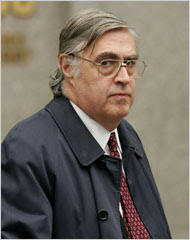| "On March 4th,2014, a federal judge in New York City blocked one of the richest and most scrutinized judgments in the annals of class-action law from being enforced on U.S. soil. Â The announcement of that decision, a closely watched event in legal and environmental circles, further muddied the future of $9.5 billion in damages the Ecuadorean Supreme Court in 2012 ordered the oil giant Chevron to pay for the systematic contamination of a patch of Amazon rainforest the size of Rhode Island. Â In his decision capping a seven-week trial, Judge Lewis Kaplan declared the Ecuadorean judgment null and void. The ten-figure fine, he concluded, was the fruit of a jungle shakedown - the result of a "five-year effort to extort and defraud Chevron." Â The oil company cheered Kaplan's decision as "a resounding victory for [us] and our stockholders." Steven Donziger, the warhorse lawyer for the Ecuadorean plaintiffs, decried the judge as an accomplice in "the biggest corporate retaliation campaign in history." Â The New York trial marked more than a possible turning point in the no-holds-barred battle-royale pitting Chevron against homesteading farmers and a union of five Amazonian tribes. It was also a surprise homecoming. Â More than a decade ago, the same court ruled to move the case out of New York, where the plaintiffs thought it belonged, and down to Ecuador, where Chevron had cozy relations with key officials in government. The subsequent seesaw between sovereign legal systems is uncommon. Â So too Chevron's decision to counterattack the Ecuadorean decision using the RICO Act, a collection of racketeering laws usually employed in the prosecution of meth-dealing biker gangs and famous Italian crime families. Which isn't to say Chevron's RICO suit lacked Sicilian-accented echoes with mob cases. Â The oil company's sole witness to its central charge of bribery was a corrupt Ecuadorean ex-judge named Alberto Guerra, whose entire family has been naturalized and relocated on Chevron's dime. The entire case turned on the testimony of a witness living under a corporate protection plan. (Chevron has stated that the company has taken "reasonable measures, based on third-party assessments, to protect Guerra's safety and security.")
The RICO decision put another wrinkle in a case defined by unprecedented international sprawl. What began around the time of Bill Clinton's first inauguration as a class-action suit filed in a New York court has ramified into an overlapping thicket of legal systems and mutual corruption allegations playing out from Buenos Aires to Gibraltar, from Washington D.C. to the Hague.
 So far, half a dozen legal authorities have been called on to adjudicate the main-event suit and its related cases. Law professors call it a "challenging paradigmatic interface," but it's best described as an extraordinary jurisdictional clusterfuck."  Source: http://www.rollingstone.com/politics/news/sludge-match-chevron-legal-battle-ecuador-steven-donziger-20140828
 Â

U.S. District Court Judge Lewis Kaplan  Extracts from Kaplan's RICO judgement, New York, March 3rd 2014 : RICO Racketeer Influenced and Corrupt Organizations Act  "The RICO Statute Applies Here
...
RICO was drafted as a weapon in the fight against organized crime. Some therefore argue that the statute is limited to mobsters of the sort portrayed in The Godfather, Goodfellas, or The Sopranos. That argument is misconceived
...
Hobbs Act extortion, which is a RICO predicate act, requires âobtaining of property from another, with his consent, induced by wrongful use of actual or threatened force, violence, or fear, or under color of official rightâ and attempts to do so.1365 As Chevron has not paid the Judgment and nor settled the case, we are concerned here with attempted extortion.
...
One of Donzigerâs principal objectives from the early days of the Lago Agrio case was to subject Chevron to pressure sufficient to produce a generous settlement prior to judgment. Failing that, his aim was to obtain the largest possible judgment in the hope that the threat of enforcement would bring Chevron to the table or, if that did not occur, that the judgment actually could be collected.
These objectives, of course, are shared by every plaintiff in every lawsuit.
However, this case is far more complicated than this simple proposition. ...
Donzigerâs misconduct outside the courthouse went hand in hand with his misconduct within it. Both were parts of an offensive to produce a multi-billion dollar payout.
Donzigerâs âbrute forceâ campaign depended largely on his ability to threaten Chevron by portraying the litigation as a likely source of huge liability for the company.
...
Evocation of the Exxon Valdez disaster was another such weapon. Donzigerâs allegiance to the hyperbolic and highly misleading comparison between the contamination in the Orienté and the oil spilled by the Exxon Valdez further demonstrates Donzigerâs willingness to disregard the truth in order to inflate Chevronâs perceived exposure. ... The other category of activities designed to pressure Chevron to pay was the use of
the media, NGOs, the disinvestment campaign, celebrity advocacy, lobbying, incitement of official
investigations and inquiries ...
Chevron contends that every act in furtherance of this plan was an act of racketeering activity
...
The issue in this case is not what happened in the Orienté more than twenty years ago and who, if anyone, now is responsible for any wrongs then done. The issue here, instead, is whether a court decision was procured by corrupt means, regardless of whether the cause was just.  ...â
Source: http://online.wsj.com/public/resources/documents/chevrondecision.pdf  See also the Chevron RICO Amicus Brief http://www.media-alliance.org/downloads/Motion for Amicus brief-Amazon Watch-2014-0708.pdf  and this article: "Ruling poses serious threat to free speech and democracy" "Chevron and U.S. Judge Lewis A. Kaplan have acted to trample the First Amendment rights of U.S. citizens who dare to speak out against human rights abuses, environmental destruction and corporate misdeeds, according to human rights and environmental organizations Amnesty International, Amazon Watch, Friends of the Earth and the Rainforest Action Network, among others". read more.... http://amazonwatch.org/news/2014/0715-human-rights-organizations-file-amicus-brief  | 
